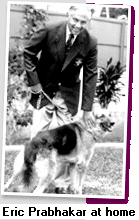
Eric Prabhakar is now back in Chennai where he spoke to Shobha Warrier.
Is participating in Olympics a dream for all sportsmen?
Very much so. I was the 100m and 200m national champion from 1942 to 1948. Those days, India consisted of India, Pakistan and Bangladesh, and my first big meet was in Lahore where I won both, the 100m and 200m dashes. It is the dream of any athlete to represent his country in the Olympics. That is the pinnacle of a sportsman's career.
How did you react when you heard that you were selected to take part in the Olympics?
I was very, very happy. I had trained very hard and except for one race, I did not lose a single race from 1942 to 1948. I was doing the final year of my master's in economics and was studying very hard for the examination when the Indo-Ceylon athletic meet took place. I lost the race, but won the third rank at university. I had by then got the Rhodes scholarship, a very prestigious and paying scholarship.
Only two people in India won the scholarship. That required me to go to Oxford for two to three years. This was at the same time when the Olympics were being held in London, in 1948. So, I first went for the Olympics and from there, I went on to Oxford.
What do you remember about the race you ran in London and life at the Olympics village?
It was the greatest day of my life. We had just become independent and V K Krishna Menon was
Did any of you get sea sick?
Yes, some of us were very sea sick, but we got over it soon. We had with us a weightlifter; a huge man who was a farmer from Andhra Pradesh. He used to have as many as 12 raw eggs every morning for breakfast. He had brought with him a huge crate full of eggs on board the ship. But unfortunately, the eggs rotted because of the heat and had to be thrown away. This man was very upset that he could not have his raw eggs as was his practice. So, after we had our breakfast, he would stay back and eat up all the eggs and everything else that was left over!
We used to tease him a lot about this. Weightlifters are generally very serious people; they take their sport very seriously and by nature too, they are very serious. And, they don't like to be teased.
Here, this weightlifter found that the world champion, who was from the United States, had 17 eggs for breakfast! So he too decided to increase his intake of eggs. And when we teased him about his appetite, he would shout, "I will catch you and throw you." But he was never able to catch us because we were too fast for him!

the high commissioner in England. We went by sea from Bombay to Liverpool. It was a converted troop carrier. It took us 17 days to reach Liverpool. We were seven athletes and a full hockey team, a football team, water polo, swimming and so on, on the ship. On all the 17 days, we used to go to the upper deck and train by ourselves. After breakfast till lunchtime, for three to four hours, we trained hard, watched by the other passengers. When we landed in Liverpool, Krishna Menon was there to receive the Indian team.

At the Olympic village, we formed groups. Mind you, this was post-war London. And, as you know,
London was badly damaged during the war. So, the circumstances then were very different from what you see today at Sydney.
Then there were these three Sikh gentlemen from the Patiala army who spoke very little English. One of them was a marathon runner, Pritham Singh. I have written about him in my book. The very first day when we landed in London, our track and field manager took us to a famous shoemaker and bought us some really up-to-date good running shoes, which we never had in India. This marathon runner said he must try them on.
He put on the shoes and took off and got hopelessly lost. When he didn't return for half-an-hour, we returned to the village. The next day an English couple brought him back to the village.
<< Back
>>Next
